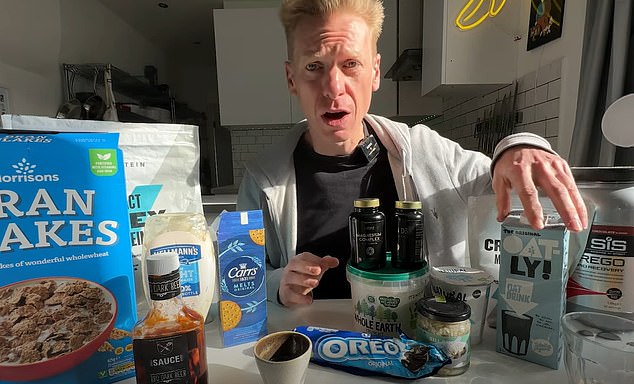Ultra-processed foods have been demonized for years for their supposed effect on our health, mental well-being and waistline.
It has led to a rise in influencers claiming that eliminating UPF and eating whole foods can treat everything from depression to lack of sleep to brain fog.
While research has linked UPFs to obesity and other health problems, some experts argue that the science is flawed because it doesn’t distinguish between products like sodas and protein shakes, despite huge nutritional differences.
Now, two online creators who ditched UPF for 30 days have revealed their experiences with DailyMail.com and don’t recommend you try it at home.
Both said the experiments left them miserable, anxious and hungry, although there were some health benefits, including calming one man’s irritable bowel syndrome (IBS).
Gavin Wren, a UK food policy expert, tried giving up ultra-processed foods (UPF) for 30 days, but found this made him anxious (pictured above with some of the foods he could no longer eat) .

To eat more whole foods, she ended up buying a whole halibut (pictured above)
Gavin Wren, a 46-year-old food policy expert in London, ditched all UPFs (products with more than five ingredients), which meant eliminating some of his favorites, such as Oreo cookies, bran flake cereals, oat milk and protein shakes. and peanut butter.
His new diet consisted mainly of fish, chickpeas, dahl, eggs, vegetables, and other whole foods (which usually have only one or two ingredients).
He said the stress of scanning the back of every package at grocery stores, spending more on food and “feeling anxious” at social events in case he couldn’t find anything to eat made him completely rethink the experiment.
Wren said: “I had higher levels of anxiety around eating out, social events and, well, grocery shopping too.”
‘I became quite obsessed with checking the ingredients on the boxes and of course that’s not very healthy.
“It’s great to eat good food and be healthy, but if every social interaction makes me a little anxious because I don’t know what I’m going to be served, then that’s not a good thing.”
His advice after the experiment is to continue eating UPF, but in moderation.
He added: “If you’re surviving on just Diet Coke and Doritos, then change.”
“But, zero ultra-processed foods, ultimately it is an extreme diet that I don’t think is healthy in today’s society.”
Meanwhile, Jon Kuhn, a 38-year-old father of two from Indiana, found UPF left him feeling so angry as it was when he quit smoking during the first few weeks.
He attributes this to being addicted to sugar.

Jon Kuhn, a father in the United States, also tried the UPF-free diet. He said that in the first days of the diet he was furious.
Before the experiment, Kuhn told DailyMail.com that he was quite ill.
A typical breakfast included sugary cereals like Reese’s Puffs and he ordered fast food several times a week.
However, she decided to leave them in the hopes of losing weight and increasing her energy levels, as well as providing a role model for her children.
According to researchers at the University of Michigan, a diet high in sugar can be addictive because over time the body can become more tolerant, causing someone to overeat to get the same “sugar rush.”
Several experts have suggested that sugar withdrawal can trigger symptoms such as irritability, anxiety and mood swings.
In the first weeks of the experiment, he said it was “difficult” and that he was constantly agitated and uncomfortable, and any sound or smell bothered him.
“It’s almost the end of the first day and I’m getting ready to make dinner and I’m so angry,” he said.
‘But Alexis (my wife), bless her, pointed out that you’re probably doing a sugar detox, and I thought it’d only been a few hours, but uh… yeah. I’m so angry.’
But towards the end, he found that the experiment had alleviated his IBS and he has now incorporated many more whole foods into his diet.
He told DailyMail.com: ‘For a long time I thought it was just my genetic makeup that led me to perpetually have irritable bowel syndrome (IBS).
‘I was eating a lot of fast food, a lot of junk food. I even ate Ranch thinking it was healthy because it was a “dairy product.”
“But improving my diet has really improved my health in many ways, although there is still room for some ultra-processed foods.”
UPFs can cause IBS by altering the microbial community in the gut, leading to the inflammation that causes the disease. He said he was back to eating UPF vegan alternatives, such as vegan meats.
During the 30-day period, Wren made several mistakes, especially over the weekend, saying it was impossible to avoid UPF and have a social life.
His first deviation came a few days into the experiment, when he was asked if he wanted chili sauce on his lunch and said yes, before realizing it was a processed food.
There was also an impact during the weekends. In the first, he went on a pub crawl of 18 bars with friends where he stopped asking places for ingredient lists because he was “having fun.”
The second, he attended a car show with his brother where the only food available were hamburgers and sausages.
And on the third, he went to watch a race with his girlfriend, who then suggested that they have ice cream.
He said at the time: “I don’t want to live in a world where I can’t eat (ice cream), literally.”
“If you have literally any kind of social life, it’s almost impossible to avoid ultra-processed foods.”
During the experiment, he said that overall his energy levels and mood felt much more stable and consistent throughout the day.
But he was grateful to eat some UPF again, saying they “made it easier to exist in a city like London.”
“It meant I could pick up food wherever I was without having to meticulously check the ingredients,” he told DailyMail.com. “And it made life more relaxing for me when I started eating them again.”
‘Ironically, the diet without processed foods didn’t really lead to any long-term changes in my diet. It reinforced to me how important it was to be able to eat whole foods and UPF.
‘But when I tried to make a living from UPF, I felt different. It’s true that I walked straight into a McDonald’s and broke a tube of Pringles… and I felt terrible after three or four days of eating like that.’
Some claim that eating UPF improves mood, but Wren said he didn’t notice any changes in that regard.


